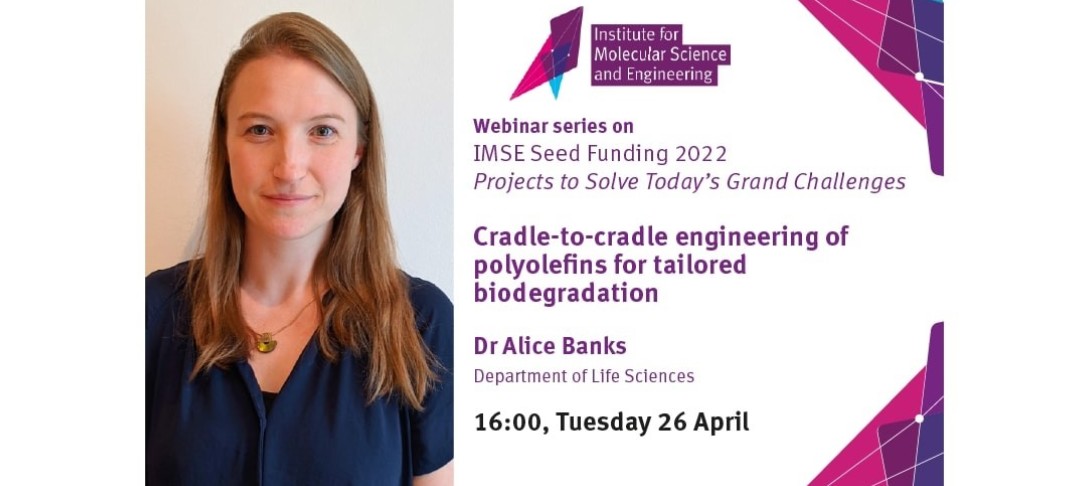
This webinar will be held on zoom. The structure of the event will be a presentation followed by audience Q&A. Please register to be sent the joining instructions. You can pre-submit questions for the Q&A section when registering.
This webinar is part of the series
IMSE Seed-funding 2022 – Projects to Solve Today’s Grand Challenges
Find our more about the IMSE seed funded projects here: https://www.imperial.ac.uk/news/235296/funding-interdisciplinary-projects-solve-todays-grand/
The theme discussed in this webinar will be:
Cradle-to-cradle engineering of polyolefins for tailored biodegradation
Abstract
The demand for commodity packaging is rising rapidly, with a particular increase in post-consumer recycled plastics in recent years resulting from efforts to meet the targets set by the UK Plastics Pact. Many challenges surround plastic recycling, and this is partly since plastics cannot be recycled indefinitely. This is due to cumulative degradation of the polymer chains, however, the mechanisms contributing to this degradation are poorly understood. Polyolefin polymers (including polyethylene and polypropylene) are widely used in many single-use plastic products, and abiotic degradation of these materials occurs through weathering and recycling processes. Here, we address the degradation of these ubiquitous plastics using microorganisms and biodegradation. The aim of this project is to manufacture a range of sustainable polyolefins materials engineered with different formulations to improve biodegradation. We seek to understand the biodegradation pathways and potential intermediates of polyolefin degradation resulting from various environmental and processing conditions. This knowledge will ultimately enable the design of polyolefin systems with tuneable biodegradability and defined disposal routes enabling entry to the circular economy, thus reducing the carbon footprint of plastics in our everyday lives.
Biography
Dr Alice Banks is a Postdoctoral Research Associate in Synthetic Biology at Imperial College London. She is currently working as part of the ERA CoBioTech consortium MIPLACE (Microbial Integration of Plastics in the Circular Economy). Her research focusses on engineering bacteria and microbial communities to degrade plastic waste, and up-cycle degradation products into new value-added materials. Prior to her current role, she worked at Newcastle University developing biologically responsive materials using cell-free protein synthesis systems; this followed a PhD at the University of Bristol in the field of fungal genetics and molecular biology. Alice is also a dedicated STEM Ambassador and member of the iGEM community, and has experience working as part of outreach, public engagement and widening participation initiatives.
About The Institute for Molecular Science and Engineering
The Institute for Molecular Science and Engineering (IMSE) is one of Imperial College London’s Global Institutes, drawing on the strength of its four faculties to address some of the grand challenges facing the world today. The Institute’s activities are focused on tackling problems where molecular innovation plays an important role.
If you have any questions about accessibility requirements please email Leah Adamson (IMSE Events Officer) on l.adamson@imperial.ac.uk